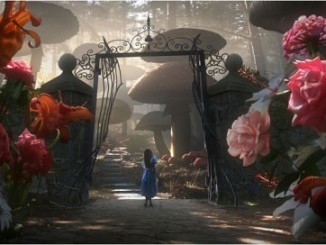 At the beginning of Big Fish, we are told by Will Bloom (Billy Crudup) that when it comes to “Telling the story of my father’s life, it is impossible to separate fact from fiction, the man from the myth.”
At the beginning of Big Fish, we are told by Will Bloom (Billy Crudup) that when it comes to “Telling the story of my father’s life, it is impossible to separate fact from fiction, the man from the myth.”
As Edward Bloom (Albert Finney in the present day sequences and Ewan McGregor in flashback) tells it, he was always too big for the small town he grew up in. After graduating high school, where he excelled in both sports and academics, he ventures out into the world where he encounters giants, works in a circus, meets the love of his life (Allison Lohman, played by Jessica Lange in the modern day sequences) and parachutes into Red China on a secret mission for the government among other adventures.
But in the present day, Edward is estranged from his son Will, who has grown tired of his father’s stories. When his father’s health takes a downturn, Will comes home in order to make one last attempt to really get to know his father. But as he spends time with Edward and looks into his past, he discovers that the line between his father’s stories and reality may be a little blurrier than he anticipated.
Big Fish is a film about the power of storytelling. Edward tells stories about his life that sometimes only have the barest of toeholds in reality. But these stories celebrate the specialness of the people he meets throughout his life, perhaps more so than just sticking to the facts would and are told in such a way that we accept them because it’s enticing to believe that the world can be as magical as Edward paints.
 While Big Fish is not a film that showcases Burton’s visual style, but it is definitely a Burton-style story. Like his early films Edward Scissorhands and Beetlejuice, Big Fish is about the search for a familial connection. Like Edward Scissorhands’ search for the love of a family or Wynona Ryder’s character in Beetlejuice‘s search for a parental figure who would pay attention to her, Will wants to know who his father really is. Burton also manages to juggle the film’s most potentially troublesome aspect, its multiple viewpoint narration, with ease.
While Big Fish is not a film that showcases Burton’s visual style, but it is definitely a Burton-style story. Like his early films Edward Scissorhands and Beetlejuice, Big Fish is about the search for a familial connection. Like Edward Scissorhands’ search for the love of a family or Wynona Ryder’s character in Beetlejuice‘s search for a parental figure who would pay attention to her, Will wants to know who his father really is. Burton also manages to juggle the film’s most potentially troublesome aspect, its multiple viewpoint narration, with ease.
To be sure, there are certain scenes that bare the unmistakable Burton visual flair. Edward’s entry into the town of Spectre once again recalls the director’s fascination with a mythical small town Americana that probably only existed in the advertisements of the 1950s. Still, without relying on his more familiar visual tricks, Burton manages to imbue the film with a sense of fairy tale and that the tales of Edward Bloom did happen in a slightly more magical version of reality just around the corner from ours.




